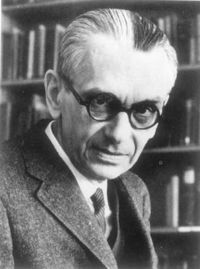Godel's Sickness Unto Death

Kurt Godel (1906-1978) is probably best known for his two incompleteness theorems. They state that for an axiomatic system of numbers (like the natural numbers) there are certain theorems which are true for those numbers which cannot be proven from the numbers themselves.
Godel was one of the brightest thinkers of his time. He won the first Einstein award in 1951 and the National Medal of Science in 1974. In addition to his famous contributions to science, he was also very involved in philosophy (he is credited with an elaboration of Leibniz' proof of God's existence).
Godel also had some curious habits. He was a shy man and eccentric. He kept his windows open through the winter because he was afraid people were trying to poison him. He spent a lot of time with doctors, because he was a sickly man. When they gave him advice, he distrusted them ... sometimes doing the very opposite of the thing they prescribed for fear they were also in league against him. He insisted on only eating his wife's cooking so as to avoid being poisoned. When his wife died, he refused to eat anything and died in 1978.
In Godel the US and the modern world had inherited a mathematician / physicist par excellence and a philosopher and theologian of some note. This man had some amazing "thoughts", so why the mental problems? And if he couldn't "think" himself out of them, what hope is there for the rest of us?
Now, to be honest, I don't know Godel. I've never met the man. I don't know if it would be fair to describe his psychological conditional as "suicidal" exactly. On the other hand, as Camus said, when a man brings himself to death he is making a certain confession. The confession is to a more or less extent that his life no longer means anything to him.
Time and time again I meet people with enormous intellectual gifts who are so reluctant to continue on with their life. And when I mention someone like Godel to one of these people they remark, "What a contemptible mystery how a genius could be so stupid as to want to take their own life ..." As if they were smart about everything but foolish in just this one little regard so as to become suicidal.
Soren Kierkegaard often noted that the greatest thinkers build beautiful systems out of ideas. Often they are in constant haste to express what one of my old college professors described as "the redundant layers of beauty" of their system. But then when you take a good look into their lives, they themselves are not (spiritually speaking) living in beauty of any kind.
Labels: Angst, The System
1 Comments:
Hi BB,
Your know paranoia is only an heightened awareness of danger. I don't find it odd that someone who possesses a heightened awareness in general would be plagued by such mistrust. In the world that we live in it is an act of denial to be able to put our heads on our pillows at night and close our eyes feeling safe and secure. We are never safe and secure but if we were to allow ourselves to be aware of this at every moment of the day, we would be considered mentally ill.
Denial gives us peace and over-awareness takes it away. Most of us choose denial but I don't think we are really dealing with reality as honestly as our neurotic brother or sister. There are mental 'illnesses' that are useful and those which aren't.
Back to Einstein, normallacy is relative.:0)
Pam
Post a Comment
<< Home